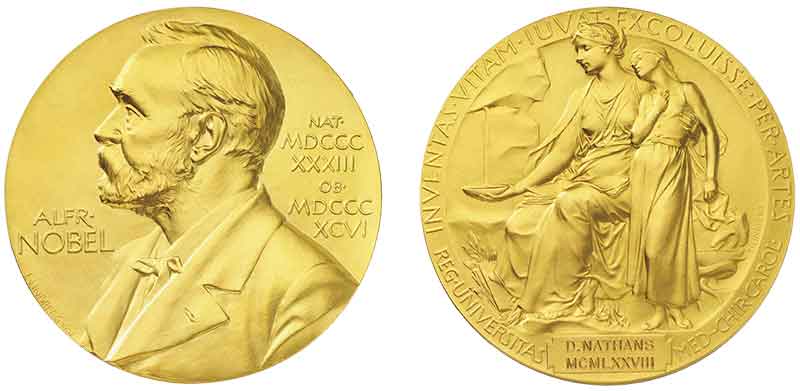Winning a Nobel Prize is a huge personal achievement. It’s not just the winners, but all their countrymen also celebrate the occasion. This is because the Nobel Prizes are widely considered to be the highest honor in their respective fields. The whole nation rejoice when someone wins a Nobel Prize. India is no different! India has a massive diaspora around the world. So, we celebrate the Nobel Prize wins not just of Indian but also that of the People of Indian Origin (PIO).
List of Indian Nobel Prize Winners
Following list contains the names of Indians and People of Indian Origin Nobel Laureates. The list is in chronological order.
1. Rabindranath Tagore (Literature, 1913)
Gurudev Rabindranath Tagore was born in Calcutta, Bengal Presidency, Undivided India on 7 May 1861. He was the first Indian to win a Nobel Prize. He was given the Nobel Prize in Literature for his poetic work Gitanjali in the year 1913. Official motivation for his award reads:
because of his profoundly sensitive, fresh and beautiful verse, by which, with consummate skill, he has made his poetic thought, expressed in his own English words, a part of the literature of the West.
2. C. V. Raman (Physics, 1930)
Sir Chandrashekhara Venkata Raman was born in Thiruvanaikoil, Madras Presidency, Undivided India on 7 November 1888. He won Nobel Prize in Physics in 1930 for the discovery of Raman Scattering and Raman Effect. Official rationale for giving him the prize reads:
For his work on the scattering of light and for the discovery of the effect named after him.
3. Har Gobind Khorana (Physiology or Medicine, 1968)
Professor Har Gobind Khorana was born in Raipur of Punjab Province of Undivided India on 9 January 1922. He adopted the citizenship of the United States in 1966 and was awarded Nobel Prize in Physiology or Medicine in 1968 along with Robert W. Holley and Marshall Nirenberg. Official rationale for giving them the prize reads:
For their interpretation of the genetic code and its function in protein synthesis.
4. Mother Teresa (Peace, 1979)
Mother Teresa was born as Anjezë Gonxhe Bojaxhiu on 26 August 1910 in Albania. She came to India in 1948 and adopted Indian citizenship in 1950. Mother Teresa was awarded Nobel Peace Prize in 1979. Official rationale to award her the prize reads:
In recognition of [her] work in bringing help to suffering humanity.
5. Subrahmanyan Chandrasekhar (Physics, 1983)
Professor Subrahmanyan Chandrasekhar was the nephew of Sir CV Raman. Chandrasekhar was born in Lahore, Punjab Province of Undivided India on 19 October 1910. In the year 1953, he and his wife, Lalitha Chandrasekhar, adopted the citizenship of the United States of America. He was awarded Nobel Prize for Physics in 1983 along with William A. Fowler. Official rationale for giving him the prize reads:
For his theoretical studies of the physical processes of importance to the structure and evolution of the stars.

6. Amartya Sen (Economics, 1998)
Professor Amartya Sen was born in Shantiniketan, Bengal Presidency, Undivided India on 3 November 1933. His main areas of research are Welfare economics, Social choice theory, Development economics. He won the Nobel Prize for Economics in 1998. Official rationale for giving him the prize reads:
for his contribution in the welfare economics.
7. Venkatraman “Venki” Ramakrishnan (Chemistry, 2009)
Professor Venki Ramakrishnan was born in Chidambaram, Tamil Nadu, India in 1952. He later adopted citizenship of the United Kingdom and the United States. Along with Thomas A. Steitz and Ada E. Yonath, Prof. Ramakrishnan was awarded Nobel Prize in Chemistry in 2009. Official rationale for giving them the prize reads:
For studies of the structure and function of the ribosome.
8. Kailash Satyarthi (Peace, 2014)
Kailash Satyarthi was born as Kailash Sharma in Vidisha, Madhya Pradesh, India on 11 January 1954. In the year 1980, Kailash Satyarthi, founded the Bachpan Bachao Andolan — a non-profit organization campaigning for the rights of children. He was awarded the Nobel Peace Prize in 2014 along with Pakistan’s Malala Yousafzai (the youngest Nobel Prize winner). Official rationale for giving them the prize reads:
For their struggle against the suppression of children and young people and for the right of all children to education.
9. Abhijit Banerjee (Economics, 2019)
Abhijit Vinayak Banerjee was born in Bombay, Maharashtra, India on 21 February 1961. He completed his MA in Economics from JNU in 1983 and PhD from Harvard University in 1988. Later he adopted the citizenship on the United States of America. Banerjee was given Nobel Prize in Economics along with his wife Esther Duflo and Michael Kremer. Official rationale for giving them the prize reads:
For their experimental approach to alleviating global poverty
So, this is the complete list of Indians and People of Indian Origin who have won a Nobel Prize.
Use the citation below to add this article to your bibliography
"Complete List of Indian Nobel Prize Winners." Dashamlav.com. Web. 12 June 2025. <https://dashamlav.com/list-indian-nobel-prize-winners/>
Dashamlav.com, "Complete List of Indian Nobel Prize Winners." Accessed 12 June 2025. https://dashamlav.com/list-indian-nobel-prize-winners/
"Complete List of Indian Nobel Prize Winners." (n.d.). Dashamlav.com. Retrieved 12 June 2025 from https://dashamlav.com/list-indian-nobel-prize-winners/
